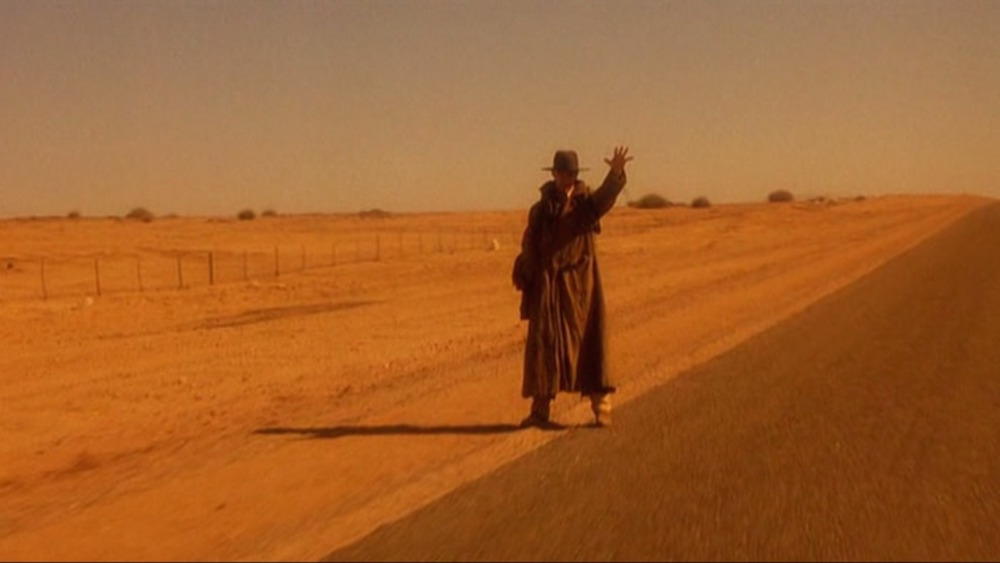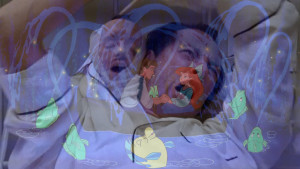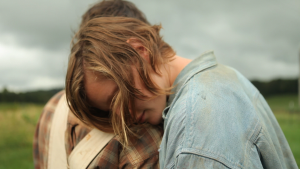
To celebrate Halloween this year, Dim the House Lights will be treating our readers to a horror movie recommendation a day for the ten days leading up to everyone’s favorite holiday. So sharpen your knives, carve your pumpkins, sit back and let the terror take over.
Richard Stanley only completed two feature films before being kicked off his third directing job days in and spending the next few decades making documentary shorts and entries for anthology horror films, yet his influence looms large, said and unsaid, over modern horror cinema. Those two features, Hardware and Dust Devil, are both perfect (or near-perfect) shots of stylistic fervor, expressionistic slices that push narrative genre film towards incoherence in their abstraction (and thank god for that). Hardware is all neon lights and blaring sounds, a pounding headache of sensory overload, and I mean that in the best way possible- though it’s sometimes too intense for me to sit down and actually finish, that’s only because it so physically embodies frayed nerves and techno-nihilistic stress, like trying to play System Shock 2 for 12 hours straight with a hangover. It’s a gory, hilariously over the top jaunt that got cyber-punk better than almost anyone else before or sense.
But it’s Dust Devil that earns him a place as one of the great unsung directors of genre film, if not one of the greatest period. If Hardware was purposefully overflowing, Dust Devil is purposefully empty; its mythology goes barely explained, most of the killing happens in the spaces between scenes, and our characters, though distinctive and full, have backstories that are more like suggestions than clear motivations. What we get instead is winding, often cyclical storytelling that emphasizes ritual, spirituality, and the disconnected nature of the body and discards anything that might tie it too tightly to the earth. The South African and Namibian landscapes we see are as much dreams as they are real places, seeming to float in a space of mystical unease instead of solid geography. Even the themes (with one of the richest being colonialism; our main character, a black police sergeant named Ben, is at one point told that in order to stop the killer, he has to stop thinking like a white man and think like a man instead) slip out of your hands if you try and grab hold of them too tight.
That is precisely why it’s so affecting, and why its rhythms demand attention and reward it equally. Robert John Burke, playing the violent spirit of the desert wind (it’s not your typical horror film), wanders between scenes like Scarlett Johansson in Under the Skin, seeking out the vulnerable to kill but nearly as wide-eyed as an innocent (until provoked, of course), wearing the disguise of a person, but never comfortably. Wendy, a woman running from her jealous, abusive husband, seems to not even know where she’s running to, just the expanse of the country, the emptiness of barren roads, the forgetful memory of piss-poor motels, before ending up in the arms of this non-human killer. Only the sangoma (a type of traditional South African diviner and healer) Joe seems to have any idea of what’s actually going on, though he can’t speak in much more than folktale and poetry that everyone else struggles to make sense of. Everything is hallucinatory and eerie, though rarely concretely so, with Stanley making the most out of the sun-baked landscapes and run-down locations and putting it all just a bit off, where you can’t place the source of your unease even though you clearly feel it.
As is probably clear, I’m struggling for more words that basically just boil down to “ritualistic and spiritual”, but this is a movie where that tone is sustained so masterfully and is so unique that it’s also the main selling point. Nothing else feels like Dust Devil, so magical, and not in the way of meaning beautiful or delightful. No, instead it feels supernatural, ghostly, like you’re stepping between planes of existence in a fog of misapplied sensory experience. It’s entirely otherworldly. The only film I can compare it to is the second half of Tropical Malady, but more sinister, dirtier, and even more perilous, a hypnotic and orange-tinted heat exhaustion nightmare of real soul-endangering terror. Though it’s easier to swallow, it takes the same liberties with your senses as Hardware, putting you in a trance and feeding you a genre movie that somehow never breaks that spell. When it’s done, I always feel like if I stand up too quickly my legs will give out. Richard Stanley, I would argue, is as close to a sorcerer as genre film has received, and Dust Devil, even mangled as it was by the studio system, is his crowning spell.
—
Dust Devil is currently available on DVD and digital platforms, though Michelle heartily recommends the out of print special edition DVD by Subversive Cinema that comes with multiple Richard Stanley documentary shorts.
Directed by Richard Stanley; written by Richard Stanley; starring Robert John Burke, Chelsea Field, and Zakes Mokae; 87 minutes.



 Derek
Derek
 Isabelle
Isabelle